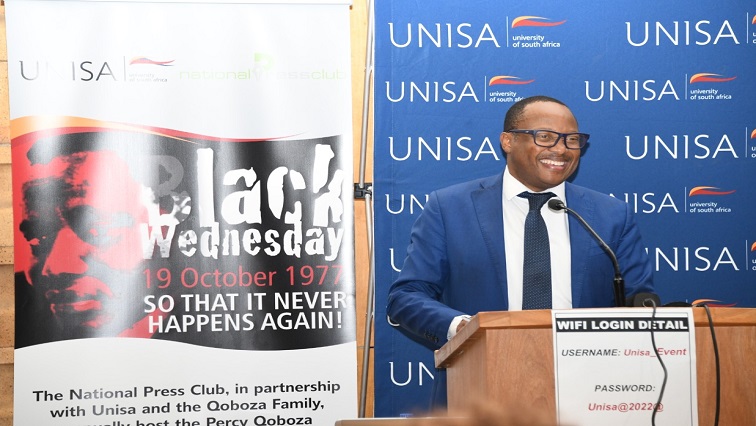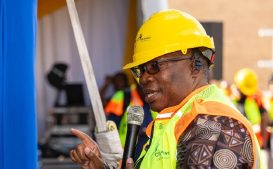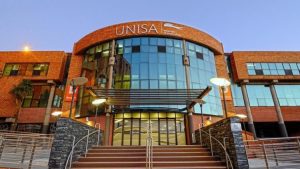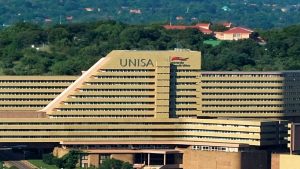Media expert, Professor Onkgopotse JJ Tabane, is urging media houses to stand in solidarity and for justice for journalists who continue to suffer at the hands of their respective oppressive governments globally.
Tabane, who is the head of Communication and Marketing at UNISA, addresses the 12th Annual Percy Qoboza Memorial Lecture at the university’s Pretoria Campus.
The event marks the 45th anniversary of Black Wednesday as hosted by Unisa and the National Press Club. The lecture commemorates the day in 1977 when the apartheid regime silenced independent voices by closing certain publications.
Theme: Media Freedom in light of the 2022 World Freedom Index points to worrying signs for freedom of expression in Southern Africa, with several countries recording sharp declines.#QobozaLecture #BlackWednesday @unisaradio @npclub pic.twitter.com/EyuF8wRA04
— Unisa (@unisa) October 19, 2022
Tabane says South Africa is no exception when it comes to media freedom violations and harassment of journalists by politicians. He says the ongoing court case in which former President Jacob Zuma is suing journalist Karryn Maughan is utter disgust and undermines freedom of the press.
“Just last week President Jacob Zuma resurrected from suing journalist Karyn Maughn for talking about his criminal records that are already in the public domain. Do you understand? So I don’t know who’s advising him. So suing a journalist for mentioning something like that which is also in court- you don’t need a long argument to know if someone has a “get out jail free” card,” says Tabane, who also mentioned that he had been summoned to the Broadcast Complaints Commission of South Africa at least five times and has received countless letters from politicians.
Tabane singled out Zimbabwe as one of the countries that continue to undermine press freedom by brutalising journalists.
“According to MISA [Media Institute of Southern Africa], over 20 journalists were jailed and tortured in Zimbabwe this year alone. Pressure has to be brought there through the AU and all its organs to rein in countries that suppress the freedom of the media. We cannot pay proper tribute to Percy Qoboza if we don’t do these basics to keep his name alive,” he continued.
Gauteng Premier Panyasa Lesufi was among the speakers of the day. He questioned media independence and vigilance when reporting about some of the country’s crucial events.
“One thing that really shocked me- and I don’t know how it escapes the media, and no one wants to take the responsibility- you had a certain journalist, Edwin Ntshidi, who was covering politics and standing for political office and also covering politics- who was covering our president when he was contesting the same elections for a certain political party. Media just said sorry we didn’t know about it, but when the IEC published names of the people who were contesting the journalist’s name was there,” Lesufi cries out.
Journalist Crystal Orderson believes that in order to keep the legacy of Qobaza, more still needs to be done to protect South Africa’s press freedom.
“I think today celebrating the legacy of Percy Qoboza is a reminder that legends like him fought for the South African story and against the apartheid system, and it’s an absolute reminder- especially for us as journalists- that we have to tell the truth. Or do we have to speak truth to power when we have to keep politicians accountable? Yes, we have one of the most progressive constitutions in the world. It protects our freedom. As media workers, we cannot take that for granted.”
The Qobaza family expresses gratitude and honour for the media freedom lecture that recognises the work of their loved ones. Qoboza, who died in 1988 at the age of 50, was a South African journalist who was an outspoken critic of apartheid and one of the country’s most influential black newspaper editors of note.
“A free media is an integral part of our democracy and government is committed to press freedom. We value our regular interactions with the media formations such as @SAEditorsForum, the @npclub and the Press Gallery.” – Minister Mondli Gungubele#BlackWednesday pic.twitter.com/srUWuqBzQo
— South African Government (@GovernmentZA) October 19, 2022






